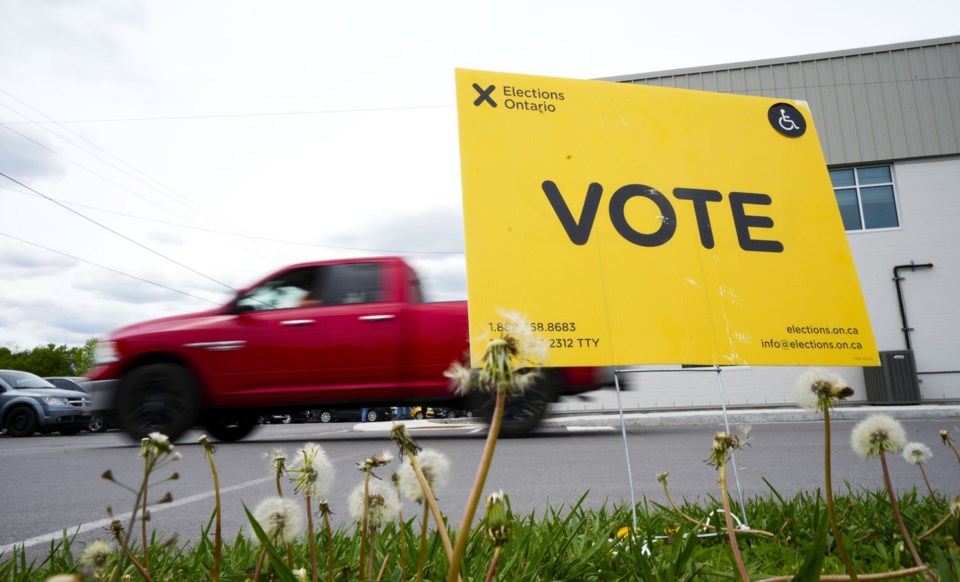TORONTO — The last time Ontarians went to the polls, the province recorded the lowest voter turnout in its election history. Observers say they don't expect a significant change in this month's snap election.
In June 2022, just 44 per cent of 10.7 million eligible voters cast a ballot in the election that yielded a sweeping victory for Doug Ford's Progressive Conservatives. As Ford seeks an even bigger electoral mandate, some expect that trend to continue in the Feb. 27 vote.
University of Toronto political science professor Randy Besco said voter frustration, anger and a competitive race drive higher turnouts, but those elements don't seem to be at play in this election.
"If they're angry about things and they want change, then they get out and vote," he said. "And the other thing is that turnout tends to be high when … the results are close and it's unclear who is going to win."
Observers point out that Ford already had a large majority government, his party is polling well, and his "Team Canada" approach U.S. tariff threats has only boosted his profile.
Lydia Miljan, a political science professor at the University of Windsor, said in addition to a perceived lack of competition and needle-moving voter anger, other factors may also lead to lacklustre turnout.
She said Ford’s decision to call an election nearly 1 1/2 years before the fixed date took Ontarians "off guard," and the short campaign leading up to a very rare February vote – when some people may be travelling for winter vacations – could lower voter participation.
Chaos in federal politics, with Prime Minister Justin Trudeau set to step down as soon as the Liberal party chooses its new leader in early March, may turn out to be another distraction for Ontario voters, Miljan said.
"Simultaneously, people are gearing up for a federal election campaign," she said.
Getting out the votes in northern parts of the province, where winter weather is harsher, could prove especially hard, Miljan suggested.
"I think that actually we might even have a lower turnout than last time's historic low."
But Besco said weather is unlikely to affect voter turnout, unless blizzards or extreme cold hit parts of the province on election day.
Elections Ontario has said there are "contingency plans" in case of severe weather.
"We are working closely with local and provincial authorities to monitor the situation and provide frequent updates for those of you who are unable to make it to a polling station," the province's chief electoral officer, Greg Essensa, said.
Essensa said efforts are underway to make voting easy for the 10.8 million Ontarians who can cast a ballot in this election. That includes options to vote by mail, at an advanced polling station or on election day. Under certain circumstances, some voters may also be able to vote from home or a hospital.
Both Besco and Miljan said low voter turnout is not necessarily an issue.
It means people are "fine with the status quo and there's no big problems ... you know, sometimes politics is boring," Besco said.
Miljan said she doesn't equate low voter turnout with low public engagement, or see it as "somehow a problem for democracy."
"If people are happy with the system, they may not vote just because there there's no great incentive," she said.
Myer Siemiatycki, professor emeritus of politics at Toronto Metropolitan University, agrees that fewer people are likely to vote in this election, but said he could be proven wrong.
If Ontarians deem U.S. President Donald Trump's cross-border policies an "existential moment," they will be motivated to elect a premier who can fight back, he said.
A higher voter turnout is also possible if enough people believe that Ford wasted taxpayers' dollars by calling an early election that wasn't necessary, Siemiatycki added.
He said the participation of less than two-thirds of eligible voters is not healthy for any democracy.
"In the business I was in – and I used past tense because I am a retired professor – that was a failing grade," he said. "That was an embarrassing, humiliating failing grade."
– With files from Allison Jones.
This report by The Canadian Press was first published Feb. 2, 2025.
Sharif Hassan, The Canadian Press
